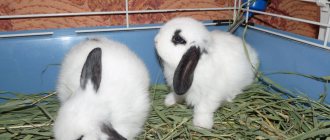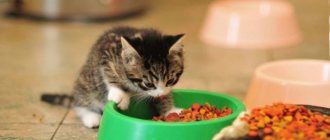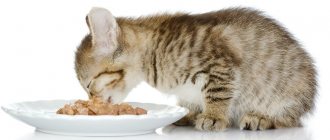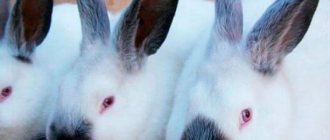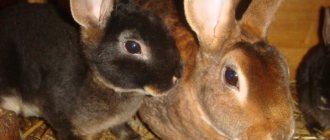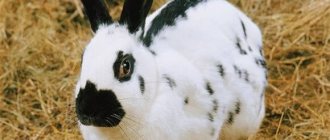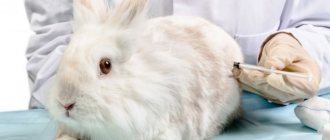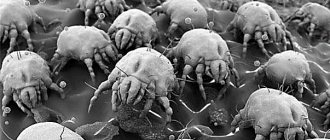Livestock » Rabbits
1
4383
Article rating
Kira Stoletova
Every farmer should know what rabbits eat at home. The rabbit is a unique animal, its meat is an ideal dietary product, and its fur is used to sew fur coats, hats, and the skins are used for gloves. Despite all the advantages, keeping a rabbit is not so easy. The most important thing is to choose the right diet for your picky pet. Any beginning rabbit breeder should learn this. Feeding rabbits is not that difficult, but you should approach this issue responsibly.
What do rabbits eat?
A menu for eared rabbits must be drawn up for every day and its execution must be strictly monitored, otherwise it will not be possible to breed rabbits. Almost the only serious problem that rabbit farm owners face is feeding the animals. Immediately after acquiring pets, you need to create a diet for them, and for this you need to know what rabbits eat at home. The basic principles of feeding should be based on balance and variety.
Why is it important to feed rabbits properly?
- They have very weak stomach muscles. The intestines and stomach should never be empty, and for this you need to give your pets food often and know what they can eat. It is necessary to feed rabbits in small portions, and then leave hay and water in the cage.
- Rabbits' digestion works hard throughout the day. The rabbit must constantly chew and drink. When leaving home, even for a few hours, you must leave the necessary food for the animals.
- Predisposition to diarrhea. Foliage and twigs protect the stomach and intestines from infections. With a properly formulated diet, the pet will develop and grow normally.
- Weak immunity. Rabbits need to constantly develop and improve the quality of their immunity and be given products that activate the protective properties of the animal’s body.
Owners of rabbit families must ask themselves what they want to get out of their enterprise. If the goal is tender meat and shiny skins, then taking care of the nutrition of domestic rabbits is the first necessity. To breed pets for meat, you need to add more protein foods to the menu. If you plan to feed rabbits with compound feed, then it is better to choose special mash for fattening animals for meat. Also, any food is divided according to the age and characteristics of the pet.
For example, pregnant females and small rabbits need to be fed with minerals and vitamins added to their food.
You also need to know what and when domestic rabbits eat, what can be given to animals, and what is strictly prohibited. You should carefully familiarize yourself with the feeding habits, types of feed, diseases and treatment of rabbits for them. You can study reviews of what experienced farmers feed rabbits at home or in a factory. Rabbit breeders can share their stories. Sometimes it takes many years to acquire the skills to properly feed rabbits.
Conditionally permitted and prohibited foods
Rabbits are omnivores, but are sensitive to the quality of the food they eat. Even among the usual vegetables, cereals and herbs, there are some that can negatively affect their health.
A list of conditionally acceptable and unauthorized food for animals is presented below.
Table: permitted and prohibited foods for rabbits
| Give with restrictions | Can't give |
|
|
Animals have some peculiarities in terms of digestion. They have a weak stomach, so food must always be present in it. To prevent problems with the digestive system, it is unacceptable to keep rabbits hungry. Over-salted and acidic foods are contraindicated for animals. Freshly cut grass causes bloating, so you don’t give it right away, but let it dry in the sun. It is unacceptable to feed dirty root vegetables.
Basic food
Like all rodents, long-eared animals eat any plant food. Fresh grass or dried tops doesn’t really matter. It is best if food for rabbits is taken from your own garden, since store-bought products may be loaded with chemicals to extend their shelf life. Rabbits especially like beans and all legume plants. This is the main ingredient in the rabbit menu.
In addition to plants, rodent owners should offer their pets other types of food, then the rabbits will grow healthy, cheerful and bring their owners not only joy, but also a good income. How many types of food are there? There are only 4 of them, and all of them must be present on the rabbit menu.
Green feed
Green food is grass, but not all of it. Animals eat best clover, wormwood, nettle, yarrow and tansy. These herbs have medicinal properties, which is also important. The rabbit's body is designed in such a way that it independently senses which grass it needs to eat more and which less. The ideal option is for rabbits to graze on the lawn and get their own food.
Of course, provided you are sure what type of grass grows on the site, you can provide it to animals without any special worries from spring to late autumn. But you will have to stock up on hay for the winter. Preference should be given to legumes, legumes, seeds, and grains. This also includes cabbage of any variety (except red), tops from vegetables. Rabbits especially love to feast on beet tops and Jerusalem artichoke, but these are very sweet, so sugar and fodder beet tops should not exceed 1/3 of the rabbit’s entire lunch portion. Potato tops - 1/4 of the total feed mass. There is a 100% ban on tomato tops.
Rye, clover and lupine can be planted independently in early spring, then the rabbits will be provided with fresh grass for a long time. You should be careful when using wild herbs for food: there is a high chance of accidentally taking poisonous ones along with useful ones. Young grass should be mowed, as it is tastier and healthier.
Together with herbs, twigs and leaves of alder, yarrow, and oak are served on the table. This will strengthen the functioning of the rabbits’ gastrointestinal tract. It is important to remember that they have weak intestines and stomachs; the digestive organs need to be helped to work. Feeding small rabbits beets and their tops is generally prohibited!
Of course, pets also develop their own food preferences. Beets and dandelions are their favorite delicacies. But this does not mean at all that this is the only thing you need to feed them. In no case. You need to create the menu yourself and monitor the health of the animals. If digestive disturbances become noticeable, you should reconsider your diet.
Juicy feed
These are root crops and silage grown in beds. Succulent feed is used more often in winter, when there is no source of nutrients. Juicy foods are less rich in fiber and more rich in vitamins. Mother rabbits are especially useful: they increase the amount of milk for feeding babies, and good feeding of rabbits reduces the risk of death of young animals.
What products are considered succulent foods?
- Cabbage. Rich in vitamins C, E. May cause bloating and fermentation in the gastrointestinal tract. Small portions are the best solution to this problem.
- Beets (any kind, fodder or sugar). Increases metabolism and immunity. It has a weakening effect on the intestines, so it needs to be secured (oak and alder branches are good).
- Pumpkin. The key to a beautiful skin is regular consumption of pumpkin.
- Carrot. Rabbits' favorite food. Red and yellow products should be given. The same applies to cubs: they can be offered carrots from 3 weeks of age, starting from 10-15 years old. In winter, rabbits also eat carrots dried from the summer. It retains a sufficient amount of carotene, vitamins B1, B2, C.
- Potato. It is recommended to boil it before use. Starch is not the most ideal component in the diet of rabbits, since it is difficult to digest, so it is not advisable to give it in its pure form. It is better to mix with other types of feed. Potatoes are quite nutritious, rodents will be full for a long time.
- Silage. You need to cook it yourself or buy it. This is a simple procedure. Silage is mixed in pits or barrels, preferably made of wood. The silage contains beets and other vegetables, tops, and herbs. Everything is mixed, laid, covered with clay. It is necessary to close the hole tightly so that the least amount of oxygen enters the pit or barrel. The silage is ready after 2 months of aging.
A few secrets about silage
- You cannot use potato and beet tops.
- Corn (cobs) and peas (lashes) are very suitable.
- You can add floury paste to the barrel or pit. The process will go faster.
- Good silage cannot smell of mold or rot. High-quality and fresh silage smells like sauerkraut. It is necessary to make sure that the preparations have not rotted: spoiled food will lead to the death of rabbit families.
Roughage
Rough food creates comfortable digestion for rodents. Hay, branches, grass meal, straw are all sources of protein and fiber. Approximately 1/4 of the feed portion is required. Grass is cut for hay in the spring, when it blooms, before the grass becomes coarse or yellow. It is better to choose places for mowing with good soil moisture. These can be the same herbs used for green fodder. The hay must be dried and then stored in dry, well-ventilated areas. Mown grass is best preserved on special wooden flooring at a distance of about 50 cm from the ground.
This will save roughage from rodents. If the hay is poorly preserved, it can be processed to produce good grass meal. It is added to the food in small portions. Drying hay in the bright sun is also a bad idea: vitamins are lost, and rabbits eat such a product without much pleasure. Tree branches are good for rabbits' digestion. These can be branches of oak, alder, acacia, linden. It is possible to use branches of bushes: raspberries.
Ledum, elderberry, bird cherry, apricot are poison for rabbits. It is strictly forbidden to use such branches when feeding. It is very convenient to store branches in winter, right in the snow. As a result, they do not lose their beneficial substances. You need to harvest in June, tying brooms and hanging them in a dry place. It is not recommended to store and dry branches in the sun. Juniper, spruce and pine branches are very fond of eared ones. Straw is prepared from oats and millet.
Concentrated feed
This is compound feed. Contains a large amount of protein. Eating mixed feed ensures that rabbits gain body weight. Concentrated feed is 1/3 of the diet. For rabbits, compound feed is suitable, which is used for feeding piglets and calves. There is a special dry granulated food for eared animals. It is very comfortable. There is no need to add anything to it, unless there is a female feeding the baby. She needs to add grain to her diet: without it, lactation can be scanty.
This type of food contains cereals. First of all, oats, they can be used whole or crushed; they have a good effect on intestinal function. Despite its nutritional value, it does not cause obesity. Corn also makes up a significant share in concentrated feed. Rabbits also eat corn porridge very well, especially small rabbits. Barley and wheat are germinated before being given to animals. This food causes fermentation. You can eat it no more than 4 days in a row. Wheat bran and cake are also perfect for feeding. This is food industry waste.
Feeding mode
Rabbits are extremely voracious animals, ready to eat day and night. That is why there should always be enough food, but not too much. The need to feed ad libitum is a misconception for new breeders. If rabbits are fed a lot of bulky food, the animals will not receive the nutrients they need. But with an excess of grains, obesity begins, which has a bad effect on the breeding and health of animals. It is necessary to adhere to the feeding regime and norms.
To date, several modes have been adopted.
| Triple mode for winter |
|
| Triple mode for summer |
|
| Quadruple mode for summer |
|
Vitamins and supplements
With a lack of vitamins, any creature has health problems. This is especially true for rabbits, whose immunity is most often weakened. Lack of vitamin supplementation leads to illness, loss of body weight, and a decrease in the number of offspring. As a top dressing, you can make a whole list of what the rabbit eats and give branches of lilac, as well as willow, pine, fireweed, pepper, buckwheat, barley, sunflowers. Vegetables include Jerusalem artichoke, zucchini, herbs and cucumbers.
What vitamins do rabbits need?
- Fish fat. Vitamin A, D.
It should be given to all individuals, regardless of age. From 0.5 g for babies, up to 3 g for nursing rabbits.
- Vitamin E.
Present in sprouted wheat. If there is no wheat in your diet, you can add vitamin E separately to your food.
- Phosphorus and calcium.
Contained in bone meal, bone ash. Chalk is also a source of these vitamins.
- Minerals.
Table salt is the main source of minerals for animals. Salt is calculated in the same way as fish oil. Babies are allowed 0.5 g per day, males and non-breastfeeding rabbits - 2 g, lactating rabbits - 3 g. The need for vitamins and minerals increases with the arrival of cold weather. Don’t forget to treat your pets to them every day in winter. If there is a lack of some element, pets can eat paper or their own fluff in the cage, so it is very important to give all the necessary microelements that animals eat and tolerate well.
What do rabbits eat in summer and winter?
In the summer, it’s a pleasure to create a menu for constantly gnawing pets. A variety of herbs and plants makes it possible to vary the diet. At this time, it is necessary to monitor the condition of the animals: add hay and branches to help pets cope with the problems of bloating. In addition, lush grass and tops contain a lot of water, which also contributes to diarrhea.
Winter is a difficult period. You need to prepare for it in advance, select the necessary grains. If you spend part of the summer on this, you won’t have to grab your head in cold February, running around looking for silage and straw for feed. Vegetables and root vegetables can be stored not only fresh, but also frozen or dried. They will still have enough vitamins and minerals. By the way, not everyone knows that sauerkraut is a treat for rabbits. It can be prepared in large quantities and there are usually no problems with storage. Don't forget about chalk and table salt. Needles and branches of coniferous plants are a source of vitamin C; it would also be useful to give Christmas tree and pine. Vitamin C is necessary in winter to maintain immunity. In winter, adding such branches to the diet of rabbits is a rule.
Another rule is to increase the portions for rabbits not only with age, but also when the ambient temperature drops. It is better to give warmed food on especially cold days. Warm porridge is good for young animals. You need to pay special attention to the drinking bowls in winter: the water freezes in the cold, and rabbits drink often. Water is necessary for digestion; without it, pets will quickly die. If a rabbit is thirsty, it will chew on ice, but this will not be good for its health. Food in feeders can also freeze.
How to properly create a diet for rabbits at home
Depending on the time of year, animals' bodies require different diets. In winter there is always a deficiency of vitamins, and in summer you can replenish the necessary supply thanks to greens. Let's look at ideal food options for rabbits in winter and summer.
In summer
In summer, most of the diet consists of green food. The ideal daily summer diet for rabbits of different groups:
| Fattening | 750 g of grass, 65–70 g of concentrated food, 1 g of salt and chalk. |
| Young animals | 400 g of grass, 40 g of concentrated food and 0.5–1 g of salt and chalk. |
| Female in pregnancy and male during the reproductive period | 800 g of grass, 80 g of concentrated food and 1 g of salt and chalk. |
In the summer, it is not necessary to add any vitamin supplements, since grass and concentrated food will sufficiently enrich the body.
in winter
In winter, the main food becomes hay and succulent food. An approximate daily nutritious diet should look like this:
| Fattening | 150–200 g of hay; 500–550 g of succulent food, 80–100 g of concentrated food, 1 g of salt and chalk. |
| Young animals | 75–100 g of hay; 150–200 g of succulent food, 50–70 g of concentrated food, 1 g of salt and chalk. |
| Female in pregnancy and male during the reproductive period | 150–200 g of hay; 200–250 g of succulent food, 55–70 g of concentrated food, 1 g of salt and chalk. |
In winter, additional feeding containing vitamin E (sprouted grains, baker's yeast, fresh grass sprouted at home) will be of great benefit.
So, feeding rabbits in summer and winter is very different due to the different needs of the animal’s body. With a properly selected diet, your pet will always remain healthy and cheerful, and in case of deviation from the norm and the presence of symptoms of poisoning or illness, you must immediately contact a veterinarian.
Dietary restrictions for rabbits
- Sweet. We are talking about confectionery and chocolate products.
- Branches and fruits of apricot, bird cherry.
- Herbs spurge, begonia, celandine.
- Tomato tops and fruits.
- Pea and corn husks.
- Mushrooms.
- Red cabbage.
- Nuts.
- Pea porridge.
- Some fruits, such as agave.
- Honeysuckle.
- Christmas trees and large branches of other trees should not be given until 3 months of age.
- Mustard.
- The first vegetable that should not be given is onions, but many livestock farmers claim that dried onions have become part of imported feed for rabbits.
- Alfalfa can be given only in dry form and with restrictions.
Raising rabbits is not easy, but it is a lot of fun. They multiply quickly, which is good news for the enterprising farmer. It is necessary to be attentive to the needs of the animal, follow simple rules, follow advice, then problems can be avoided. It is important to remember that the rabbit is unpretentious in food, but requires careful attention to the peculiarities of the digestive system.
Useful tips
After each meal, the cage, drinking bowls and feeders should be cleaned. If such precautions are not followed, an unsanitary situation may result. In such conditions, pets are more likely than others to contract various diseases. If you do not remove droppings and leftover food at all, this attracts rodents, primarily mice, which are considered carriers of diseases. What needs to be done and why?
To clean the cage, if animals are kept indoors, disinfectants should be used. If rabbits are kept outdoors (in burrows or greenhouses), then you need to arrange their home for the pets and seal all possible holes. Some rabbit breeders use moss (reindeer moss) for planting.
If your pets have digestive problems, you can give them chamomile. Farmers give chamomile as an anti-inflammatory agent and also to improve food absorption. Chamomile is not given raw; first you need to dry it a little. All fruits and vegetables are introduced into the rabbits’ diet gradually and start with small dosages. Before giving your rabbit fruits or vegetables, they need to be washed under running water and all seeds and peels removed. Do not give rotten or spoiled food. If you follow simple rules for the care, maintenance and feeding of pets, and most importantly, know what rabbits eat, then you can raise healthy and active animals even at home.
